Kari’s eviction notice came swiftly. She had a month to find new accommodations for her and her adult sons with special needs. Unsure how she could find a place on such short notice, Kari considered all her options, from living in a storage unit to even living in her car. Then she remembered a community organization.
“I knew about Bissell Centre—I worked with Bissell Centre while teaching a crafting course,” Kari says. Despite her prior knowledge of the organization, Kari was surprised to learn about the Community Bridge program and how it could help her secure a new home.
As part of the Community Bridge program, Kari was given a $2,000 open-ended, interest-free loan to cover her damage deposit and rent, which she paid back proudly. “I wanted to make sure that resource was there and ready for the next person who needed help.”
A Kokum’s Giving Spirit
This giving spirit is typical for Kari – whose community frequently refers to her as the Community Kokum, or grandmother, providing love, support, and guidance whenever and wherever she can. Even when her pantry was empty and her power shut off, Kari still looked after others and considered her situation manageable.
“I’ve had to flee domestic violence,” says Kari. “While in the shelters, I saw many women in similar situations and how much worse off I could have been. I never saw myself as a victim. I have a lot of resilience that’s helped me through some tough times.”
Prior to reaching out to Community Bridge, Kari faced many uphill battles – especially when it came to where she called home. Kari has moved four times in four years through low-income housing and encountered varying levels of domestic violence and abuse. She’s also struggled with her adult children’s special needs, experienced houselessness while seven months pregnant and underwent multiple medical procedures. Kari tried to push through it without any outside help, but when she needed assistance, she knew Bissell Centre would be there with solutions. However, Kari wasn’t expecting this amount of support from Bissell Centre’s Community Bridge.
“Everything with Community Bridge was no pressure and fell into place seamlessly,” Kari explains. “It took two weeks to learn I had a loan and two weeks after that, I secured my place. I took possession of my new home before I moved out of the last place.”
How Community Bridge Helped Kari
The Community Bridge program is essential to Bissell Centre’s operations. Between April 2022 and March 2023, the Community Bridge program prevented 511 individuals from housing-loss, resulting in 214 households served, with another 202 households assisted with loans. Ensuring people don’t lose their homes and experience houselessness is the team’s top priority – so the first place they look to help folks out is with their current landlords. The team negotiates on behalf of the people they’re helping to prevent any untimely evictions.
When landlords are unable to negotiate any further and eviction is imminent, Community Bridge Support Workers then work directly with the people who need a new place to live, helping make the transition to their new place as seamless as possible.
Partners Make These Programs Possible
A program like this wouldn’t be possible without our partners in the community, like ENMAX. Their support has been crucial for Community Bridge to help people find places to call home.
And as Kari points out, it’s not just finding and funding new spaces that makes this program indispensable – it’s the regular follow-ups and wraparound services that have helped keep her and her family in their new home.
“I think more people should check out Bissell Centre to know what it has to offer,” says Kari. “Without Community Bridge, I would be experiencing houselessness. I never thought I would be in that position. Bissell Centre made sure I still had a place my sons and I could call home.”
Here’s some quick math: If one person had 15,000 pairs of underwear, they could wear a new pair every day for close to 30 years.
At Bissell Centre, we give out 15,000 pairs of new underwear to our Community Members every six months – and the need is still growing.
Underwear isn’t often the first need most people think about when they want to support folks experiencing poverty. Oftentimes, clean underwear makes a huge difference not only in someone’s personal feelings and outlook. It can also help with physical and mental health issues that can be life-changing.

Physical Health Benefits of Clean Underwear
Underwear accumulates a lot of microbes from your body and collects bacteria that can fester without washing. Not only is that an awful odour to try to live in, but it also sticks to the skin and, if left for too long, can lead to infections. It’s even a direct cause of kidney failure and bladder cancer.
Changing into clean underwear is the only way to reduce that risk. If we have no underwear to give out to folks, it’s likely that many more people will be going into emergency rooms and dying from something so easily preventable.

Mental Health Benefits of Clean Underwear
A lot of difference can be made with a little more comfort. A stop by our Community Space includes a hot shower, a meal, some time to do laundry, and a stop by the Community Closet for some fresh clothes. Those four steps are crucial to folks deciding to take the next step and look for help to find their way out of poverty. When you’re working through hard times, fresh underwear is priceless.
This is where we build trust and watch their self-confidence grow. They’re not afraid to talk to people anymore. They’re okay opening up about what their goals look like. Then they start to feel dignity and understand they are worth more than their challenges or their situation. This is when they reach out for help with their mental health, addictions, housing, and employment.
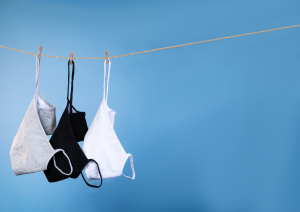
15,000 Pairs of Underwear Donations are Needed
For as long as Bissell Centre has been giving clothes to folks who need them most, underwear has been the single most requested item – but it’s also the least donated. That’s why, each year, we run the Drop Your Gonch campaign. Folks don’t often think about underwear – it’s an embarrassing topic. It’s also an important topic – especially for folks in our community.
Make sure to check out the Drop Your Gonch information page for drop-off locations, donation wish lists, and lists of items we can’t accept.
And think of underwear the next time you get a bag of donations together. Pick up a fresh pair on your way and drop them in the bag. A quick extra step could change a life.
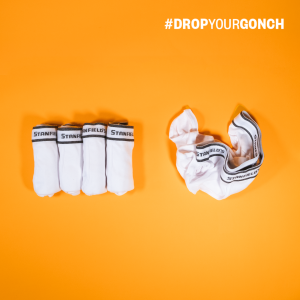
Michelle’s Story About Overcoming Poverty
This is Michelle. She grew up in Edmonton. Whenever Michelle returns to Edmonton, she sits on the curb next to Bissell Centre’s community space. “This is where she sat,” Michelle says. “And I feel like she’s still here. I tell her that I love her whenever I sit here.”
Michelle’s mom regularly visited Bissell Centre, requiring services from drop-in supports to the housing program. “My mom was a residential school survivor, she became addicted to alcohol and drugs over the years. She was the most loving, kind mom before that.”
She sits on the curb, lights the sage in a small cast iron skillet and places her headphones into her ears. She takes a long breath and starts talking to her mom about overcoming poverty. She tells her how she’s taking care of the babies, getting her degree, and working in corporate now – that she’s doing really good.
When Michelle says she’s doing really good, this carries a very heavy weight. This means she’s helping her children heal, providing for her family, and moving forward away from the cycle of poverty she knew. She’s breaking Intergenerational trauma and overcoming systemic oppression. And she’s able to give back.
Another breath and she begins singing. Not starting with a whisper, but right from the bottom of her feet, out her mouth, and reverberating across 96 Street. Wandering up and down the alleyway where her mother passed away, she releases every emotion in her being with every word she sings.
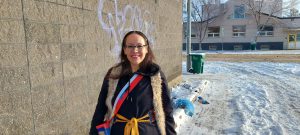
Where Michelle is today
Today, Michelle is a social worker with a background in childcare and Indigenous culture. She now lives in central Alberta. She is part of an Alberta Health Services advisory council, where she regularly attends meetings to help offer better services to all Albertans.
Overcoming poverty was not an easy path. Growing up in poverty and with parents experiencing addiction meant she had to work four times as hard to get where she is today. Michelle was able to find a path that was healthier and more fulfilling for her and her family.
Michelle’s Journey to Bissell
As a child, Michelle (along with her mother and three siblings) left their northern Alberta community to escape toxic family dynamics and domestic violence. The family travelled to Edmonton for a better life. But both of her parents quickly experienced addictions, and it wasn’t long before Michelle’s mother found herself living in Edmonton without shelter.
After she became a parent, Michelle came to Bissell Centre for some basic needs, the child care program, and the parent program. This is where she met childcare worker Fatima and family supports worker Cheryl. Michelle felt honoured that these women heard her story and believed she could one day leave poverty behind – once and for all. It was the first time Michelle felt like her support was nonjudgmental, encouraging, and believed in her goals.
“Being an Indigenous woman, in my experience, was being told to be quiet a lot,” Michelle says. She points out how Bissell’s service delivery approach helped her heal from her trauma. “Many programs [from other service providers] would often parent or monitor my life. Bissell treated me like a person. They gave me wings to fly.”
Michelle and her siblings each had their own challenges with poverty and addiction as they grew into adults. Though Michelle overcame her challenges, much of her family succumbed to their challenges. She honours her only brother’s death in 2015, her youngest sister’s death from COVID in 2022, and her sister-in-law’s death that same year. By 2016, her mother’s life would be cut short by complications due to pneumonia.
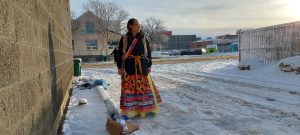
Michelle’s Giving Back
Speaking from her experiences, Michelle thinks trauma is often not openly spoken about. She did not have access to many role models speaking eloquently about the realities of being Indigenous. She’s learning to manage her trauma through post-secondary education, her art, her work as a facilitator, and being a two-spirited leader. She is a strong Indigenous mother teaching her children about their culture, history, customs, and their connections back to the land.
After she finished her ceremony, she walked around the corner to the folks standing in line at the Community Space. Michelle spots an elderly Indigenous woman and gifts her the tobacco. She hears about how her new friend just found her new place to call home. The tobacco will hang in the new home – Michelle’s gift as an act of healing.
Michelle comes back, smiling wide as she cleans from her own healing ritual. She tells us how happy she is for her new friends. “They’re doing really good!”
At Bissell Centre, our mission is to end poverty and houselessness in the community. In order to achieve this we need to fully understand what barriers people experience receiving care, the stigma they are forced to wear, what injuries are they suffering with and how we can best build programs to support individuals while they work their way out of houselessness and poverty.
Injuries can happen to anyone, at any time, creating new obstacles to daily living and changes in circumstances. What if you’re already facing barriers and obstacles to prosperous daily living? What if new injuries will further decrease your chances of leaving poverty and improving your circumstances?
The Injury Prevention Centre gathered information from 2019 & 2020 to look at more than 11,600 emergency room visits. This report, Houselessness and Injuries in Alberta: 2019-2020, dives into what injuries are sustained and shows us which injuries are preventable. While no one can prepare and prevent all injuries, we can look at the data to determine priorities in programming.
One thing the data makes clear is that Housing First and harm reduction practices would prevent more than half of these injuries. We need to ensure we’re communicating this to the public, so that we can all work towards a community where people are safe no matter their circumstances.
We invite you to read the report below to learn more and see the data for yourself.
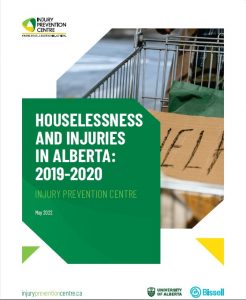
My name is Bill and I received a second chance at life after finding out about Bissell and the supports they offer. Bissell does amazing work helping those Edmontonians like me who are struggling to get by after life has kicked them down. And I’m so thankful I was able to access Bissell Centre’s programs back when I needed them most.
Back when Covid-19 first hit, I had a job at a restaurant, and plenty of experience in the industry. Then the restaurant closed without warning. It was total chaos for restaurants, like so many jobs, so finding work at another was impossible.
I didn’t have any savings, and soon I could no longer afford my rent. I had to give up my apartment and I moved into a rooming house. I didn’t know the people I was living with and there was no privacy. But hey, I had a roof over my head. I was grateful for that much at least.
Someone at that point told me about Bissell as a place to warm up and find something to eat. I didn’t think I’d ever end up going to a place like Bissell, but I’m glad I did. That first visit changed my life and it all started with a warm plate of food.
The food tasted great and the staff was even better. Everyone was so welcoming. That kept bringing me back.
But still, I found myself bored without a job, as I grew up on a farm where hard work is required and my motto has always been “if you’ve got time to lean, you’ve got time to clean.” As soon as the staff at Bissell knew of my urge to get back to work, they sent me to their Employment Services team, who were able to find me a steady job almost right away.
I wish I could say that’s the end of the story and everything worked out just fine.
Just as everything seemed to be falling into place and I felt like I had a second chance, I was hit with another blow: the rooming house I called home burned down. Everything I owned was now dust. I can’t begin to describe how I felt. I was scared, lonely, sad and angry all at once.
For the second time in one year, I was homeless. This time, thankfully I knew where to turn for help.
When I was homeless, all I could think about was how I was going to stay out of the cold, and where to find my next meal. Bissell was a warm place to go and always had a meal for me. After getting to know some of the staff, I reached out and asked for help finding a place to live and work.
The staff at Bissell got me connected with temporary lodging. Then I found another rooming house, but I didn’t feel safe there. Bissell Centre staff were able to connect me with their Community Bridge program and I found an apartment of my own.
I also now work full-time at the Bissell Centre Community Space and it’s so rewarding to work in the same space I once turned to for support. I don’t know where I would be without Bissell Centre and I am glad I never had to find out.
For me, all the support from Bissell started from a simple meal. Please make a donation to Bissell’s Easter meal and help others find the holiday meal that could be just the fresh start they’re looking for. Bissell’s Easter meal is an annual event and serves hundreds of Edmontonians. Your generosity (a single meal costs just $3.20) ensures that others receive the same helping hand that Bissell offered to me.
We’re all seeing the news record-high utility costs, record-high inflation. To many of us, these headlines will cause some discomfort at the till or through the month but overall, we’ll be ok. We’ll start buying no-name products to help with the pinch and pull from our savings, say no to ordering dinner more often and look more closely at our budgets, but we won’t be at risk of losing our homes or having our utilities cut off.
This isn’t the same for families and individuals living in poverty. April 1st, utility companies can disconnect services for nonpayment. Food in the fridge and freezer will spoil, laundry will pile up, sponge baths with colds cloths become reality, with no way to quickly cook the food in the fridge and freezer before it goes bad. It’s all very bleak and living in poverty this cycle goes on and on. You get ahead just to fall behind.
In 2021 Bissell Centre’s Community Bridge program provided 201 loans totalling $276,713.75 for utility and rental arrears for families and individuals in Edmonton, supporting 476 people including children. We were able to redirect $43,072.06 to other eviction preventions supports and with a little financial coaching, families were able to pay off $75,904.52 independently.
Take Mary for example. Mary did everything “right”. She went to school, became a nurse and worked hard and lived a nice life. Then a terrible accident left her disabled. After years of therapy, she was able to return to work part-time but part-time work isn’t enough to cover her monthly costs, so she started to get behind. With the support of our program, we helped her come up with a repayment program with her landlord, supported her with a $2000 no-interest loan and with some financial coaching Mary could pay back $517 of her debt on her own. Mary maintains her housing and has a sustainable plan to move forward.
Our Community Bridge (CB) program provides holistic housing-loss prevention supports with a supplementary loan component. CB’s goal is to prevent homelessness before it happens, as the repercussions of an eviction can be devastating.
Support Workers in our program take a client-centred case management approach to focus on the participant’s long-term housing and financial stability. Participants work with a CB Support Worker to create a sustainable financial action plan that includes an honest household budget. This plan is created by the participant with their unique financial goals in mind.
Support Workers coach clients in negotiating with landlords and utility companies and assist in applying for government benefits and accessing employment. During this period, 686 informational and supported referrals were completed to programs including employment services, mental health services, addiction support, family support, basic needs, and other community resources.
In 2022 we’re already slated to double our supports to families. In January and February, we’ve approved loans amounting to $67,146, nearly 25% of the total quantity of loans we gave out all last year. Inflation and high utility costs are more than just headlines. They are real fear factors for families who are already choosing whether they should feed their families or pay their bills. But with our help, a little financial coaching and small contributions, families can be well on their way to sustainable living.
Our Community Bridge Program is a vital part of our vision to eliminate poverty in our community.
My name is Fred, and Bissell Centre was a godsend for me.
For many years, I was a welder. When I lost my job, I was completely blindsided. For months, I searched for a new position in my field, but there simply wasn’t work to be found. If you’ve ever lost your job, you know how devastating that experience can be. It’s hard not to take it personally.
I suspect many of you have an inkling of what I went through, spending endless hours applying for jobs, only to be turned away, or worse, not to receive any kind of response at all.
To top everything off, my marriage was on the fritz. I felt like I couldn’t do anything right, no matter how hard I tried. Being part of a dying marriage was incredibly lonely.
I’d hit rock bottom once again. I found myself deeply depressed. I couldn’t stay in that house any longer. I needed space, so I left.
Leaving was important, but I had nowhere to go.
Becoming homeless in Edmonton was overwhelming and very confusing. Was I going to sleep on a park bench tonight? Would I be mugged while I slept? What’s my next step? Thankfully, I was in contact with Alberta Jobs Corps, and they referred me to Bissell Centre for help.
When I walked through Bissell Centre’s doors, I was more than a little uncertain. I didn’t know who to talk to or where to go, and I think the staff noticed that because they approached me, asked my name, and introduced themselves.
I told them a little bit about my situation, and they said, “Well Fred, you’ve come to the right place. Bissell Centre can help.”
That was about a year ago. At Bissell Centre, I’ve found the support of a family. I found people who really care. They gave me food and clothing and helped me find temporary shelter, so I wouldn’t be on the street. Before long, they helped me find affordable housing, too.
I’m a regular participant at the Community Kitchen. It’s almost always a social event. We share our life stories, where we’re going and where we’ve been.
I’ve also attended several of Bissell Centre’s holiday meals. Sometimes, when I was lonely, I came to share dinner with people who treated me well. Every time I did, I felt like I was part of a family. That’s why I’m looking forward to the Thanksgiving dinner.
I’ve come a long way since showing up at Bissell Centre’s door. Becoming homeless in Edmonton wasn’t something I ever expected. I’m now a volunteer with Bissell, so I can pay back all the good things they’ve done for me. I recently was awarded full custody of my son, and that’s been the best development of all.
Thank you for your important contributions to Bissell Centre. They’re doing great work in the community and I know that my life is heading in a new direction, all thanks to them.
…Sadly, this is a decision people experiencing houselessness have to make every single day.
For 6these folks in Edmonton, gaining access to new, clean underwear is difficult. Some individuals may wear the same pair of underwear for months at a time, and some may go without underwear for just as long. Underwear is an issue we don’t often consider but can be a serious problem for those in the community.
Underwear is one of the most requested items by the people who use Bissell Centre services, but one of the least donated items.
“It doesn’t feel comfortable when you’re not wearing any underwear, and no one likes to put dirty underwear back on after a shower. Women have accidents; they need access to clean undergarments.” – Angie
So, let’s pass the question on to you. Would you rather wear dirty underwear, or go without?
Let’s weigh each of the options:
Wear Dirty Underwear
Wearing dirty underwear may not seem like a big deal at first, but as the weeks pass, bacteria and microbes will accumulate causing an embarrassing odour, irritating rash, and infection on your skin down there!
If you’re a woman and you have a leak or accident during that time of the month, you’ll have no choice but to continue wearing the dirtied underwear, which can contribute to even more bacteria and microbe growth.
Not to mention, after you shower and get all squeaky clean, you won’t have a fresh pair of undies to slip into and will have to pop on the smelly, old, bacteria-ridden pair.
Go Full Commando
Going without underwear sounds fun —“freeing” even —but what happens when the inevitable chafing and skin irritation come along with it? You’ll have to deal with that gnarly skin rash for weeks on end!
If you’re a woman and do not have access to female hygiene products, this decision could result in the use of unsanitary or improvised hygiene products, which could lead to an infection.
Without the barrier of underwear, there’s a higher risk for foreign bacteria to make contact with your skin. Among other issues, there’s also a greater chance of fungi development because your underwear isn’t there to absorb your sweat.
Wearing underwear is something that we often take for granted, but when faced with a decision like this, it is easy to see why clean underwear is so important to those who don’t always have access to it.
When a person experiences houselessness, underwear issues can contribute to a multitude of larger health problems and discomfort. For many people, especially folks experiencing poverty and houselessness, the availability of fresh, clean underwear makes all the difference.
This is why we created our #DropYourGonch campaign: so that no one in our community would have to make the decision between wearing dirty underwear, or going without.
The Drop Your Gonch campaign aims to fill gaps in the Bissell Centre community closet by reaching out to our supporters to help stock it full of new underwear for folks experiencing poverty.
The clean underwear donated by our supporters helps to provide our community with better personal health and hygiene, and a restored sense of dignity and self-worth.
When Mike first came to Bissell Centre, he’d been living on the street for two years. You might have even seen him on the streets of Edmonton. Perhaps you were the woman who looked Mike in the eyes and said, “You need to get yourself help. There are resources to help you.”
Mike grew up in Edmonton in a family of eight. It wasn’t easy growing up in such a big family. They lived in a cramped three-bedroom house, made smaller because his mother was a hoarder, and his parents fought often.
Mike was similar to his father. He was trusting. He always saw the best in people, giving them the benefit of the doubt. If you asked, he’d give you the shirt from his back.
Once he turned 18, Mike worked and lived on his own, at times allowing his siblings, even his mother, to live with him when they struggled to get by.
Eventually, he made the journey from Edmonton to Calgary. There, he worked for years in the construction industry. Unfortunately, his business partner wasn’t trustworthy—he was underpaying and stealing work from Mike.
During this chaotic time, Mike lost his father, and it was like all the air was sucked from his lungs. The loss was devastating. With his life in shambles, he decided to return home.
Sadly, he didn’t receive the help he’d hoped to find back home. That’s when Mike became homeless for the first time. Each day was a constant struggle. No one believed in him and he certainly didn’t believe in himself.
“Give people a reason to believe in themselves again and see what they do with their lives.”
One day, a kind woman approached him on the street, and encouraged him to seek help. That was a life-changing moment for Mike. He began thinking that things could be different.
Mike found his way to Bissell Centre, where he finally got the help he needed. Scona High School had recently raised $115,000 for Bissell Centre, enabling them to form an Outreach Housing Team. Mike became their first ever participant!
With support from the new team, Mike found an affordable apartment, and got access to mental health services. He also found a rewarding sales job. He was so skilled that he soon won top sales awards and he continues to work there today.
Mike is also now working toward a business degree and is set to graduate at the end of this semester! He dreams of working with wood—he loves building things with his hands.
“Without Bissell Centre, I’d most likely be dead. Most people are on the streets because they don’t believe in themselves and no one believes in them,” Mike says. “Give people a reason to believe in themselves again and see what they do with their lives.”
Donors like you have made it possible for Mike to access Bissell Centre’s Outreach Housing Team, along with other resources. Thanks to your support, Mike has moved from poverty to prosperity.
Thank you for helping Mike and others like him to find affordable housing, and step into a brighter future!
Mike story is a feature in our May Newsletter. Read the full newsletter online now.
If Bissell Centre didn’t exist, I’d be dead—I know I’d be dead. Before they helped me, I had nothing, and now, I have everything. My name is Dave and I’m originally from BC, but moved to Yellowknife, a colder and darker city than Edmonton. Believe it.
Although I was living in Yellowknife for work, the city didn’t work for me. I was drowning there. My alcohol abuse landed me in and out of jail, and I reached a point where I said to myself, “Dave, you’ve gotta go, this city’s killing you.” So I left. I hoped moving to Edmonton would give me a new start after the hard times I’d faced up north.
When I got to Edmonton, things didn’t turn out how I planned. I didn’t know anyone in the city, and I couldn’t find a place of my own. Immediately, I ended up on the streets living rough.
I didn’t own much, but I kept my few possessions in garbage bags and carried them with me. You don’t know what it means to struggle for survival until you’ve carried everything you own in garbage bags. I got to know other characters on the Edmonton streets. It can be rough and you can’t believe or trust everyone, but I consider many of them family and friends I can trust—good people who fell on hard times.
I went to Bissell Centre pretty quickly after coming to Edmonton, and eventually it became the closest thing that I had to a home. They’ve got staff who really care about you—they became my good friends too.
Bissell Centre staff connected me with an addictions and mental health worker. They also assigned a housing worker to help find me a place. I was homeless in Edmonton for about 10 years before I was ready to look for housing. Through the Homeless to Homes program at Bissell Centre, I have a home of my own, after 10 years on the street—10 years without a place that’s warm, safe, and mine.
I had lots of friends on the street, but I wouldn’t share with anyone where I was living because I didn’t want anything to happen that might encourage old habits. I’ve worked hard to recover from alcohol addiction and I’m proud to say that I’m 18 months sober!
I’ve worked hard to recover from alcohol addiction and I’m proud to say that I’m 18 months sober!
In May of 2018, I was at home by myself and something happened to my sight. Everything looked distorted and blurry. My right side felt numb and weak. I couldn’t walk and I slumped to the floor. It was two days before a neighbour found me and called 911. I didn’t think I would make it. But thanks to my neighbour, the paramedics came and took me to the hospital where they told me that I’d had a stroke.
Somehow, Bissell Centre staff learned that I was missing and found me in the hospital. While I was in the Glenrose Hospital, they worked with my landlord to find me a new apartment—my old place was on the third floor and would’ve been impossible for me to access. The new apartment that they found for me is in a building with an elevator, so I can get into my home.
Bissell Centre’s staff have gone above and beyond for me. They do a whole bunch for me. They’re currently helping me to get into a lodge that can help me with my rehabilitation.
Before I got sober, I didn’t care. But now, I can spend my money on things that I actually enjoy, like books and DVDs. Getting housed was right on! I’ve even reconnected with my son.
I am grateful to Bissell Centre and to the people who give to them and make their work possible. They’re doing good work in our city—I wish more people knew about Bissell Centre and what they do. They got to know me and they’re still helping me where I’m at today. Without the help of the Bissell Centre, I would have died on the street. I had nothing, and now I have everything.
Donations from the community help people like Dave find a fresh start in life, feel loved and cared for, and build important connections with others. Please consider providing essential, life-changing services to people in need this Easter season.







